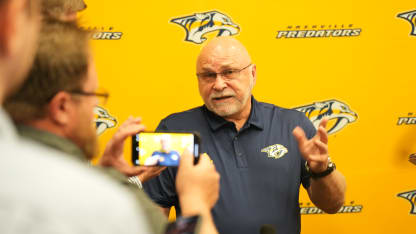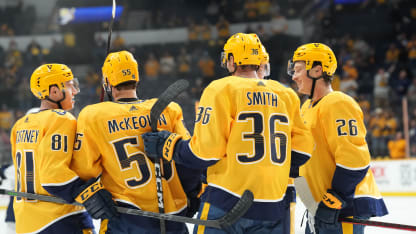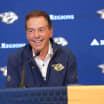More than two months have passed since he officially moved in, but Barry Trotz’s office at Bridgestone Arena is still a work in progress.
The walls are bare as they await a fresh coat of paint. Sitting in the corner are some Nashville Predators logos and signage, recently removed from the team’s home locker room area as part of a large-scale renovation. In many ways, it’s a metaphor for a team in transition – a team that is, in Trotz’s words, “somewhere between a rebuild and a reset.”
Trotz, the first and longest-tenured head coach in Predators history (15 seasons), has returned to Nashville in a new role as General Manager after spending eight seasons as Head Coach of the Washington Capitals – where he led the franchise to its first-ever Stanley Cup in 2018 – and the New York Islanders. His time away from Nashville gave him new experiences, new perspectives and new ideas on what makes a team great, and he is eager to apply his findings to an organization that holds a special place in his heart.
“I was fortunate to get eyes on other organizations, and it gives me a different perspective,” Trotz said. “I’m going to have fresh eyes on familiar surroundings… It's easy to not see the trees because of the forest sometimes, and I think I've had the opportunity to get out of the forest a bit. There's so many good things that are in place here. That’s the great foundation that [David Poile] laid.”
The Predators have an elite goaltending tandem. They have a Norris Trophy-winning captain. They have a robust crop of prospects, including five first-round picks likely to be on the roster this season for their AHL affiliate in Milwaukee. Put simply, they are a far cry from a team in need of a total rebuild.
“Some people from the outside say if you’re going to go on a full rebuild, then you can burn it down right to the core,” Trotz said. “But I looked at a number of other teams that have sort of taken it right down to the studs, and it's taken them 10-plus years to make it back in the playoffs. I don't think I want to do that. I don't think our market wants to do that. I think there's other ways to do it.”
It would have been easy to look at the moves the Preds made at the 2023 trade deadline and assume that they were going to struggle down the stretch and tumble in the standings to get a higher draft pick. Instead, they stunned the hockey world by winning games and remaining in the playoff race until the season’s final days.
“That is a player's choice,” Trotz said. “It wasn't my choice, or an organizational choice. That was a cultural player's choice. They could have [given up], and they didn't… I love the fact that there was no quit. There was no ‘Oh, woe is me’ feeling [after] we removed a number of good players. What it was was a sense of resilience; a sense of culture.”




















